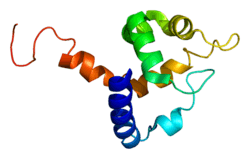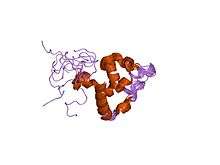ARID5B
AT-rich interactive domain-containing protein 5B is a protein that in humans is encoded by the ARID5B gene.[3][4][5]
Alternative names for this gene include Modulator recognition factor 23.
Genomics
The gene is located on the long arm of chromosome 10 (10q21.2) on the Watson (plus) strand. It spans 195,261 base pairs in length. It encodes a protein of predicted length and molecular weight of 1188 amino acids and 132.375 kilo Daltons respectively.
Clinical importance
Through genome wide association studies (GWAS),some of the single nucleotide polymorphisms (SNPs) located in this gene has been noticed to be significantly associated with susceptibility [6][7][8] as well as treatment outcomes [9]of childhood acute lymphoblastic leukaemia in ethnically diverse populations.
References
- ↑ "Human PubMed Reference:".
- ↑ "Mouse PubMed Reference:".
- ↑ Lahoud MH, Ristevski S, Venter DJ, Jermiin LS, Bertoncello I, Zavarsek S, Hasthorpe S, Drago J, de Kretser D, Hertzog PJ, Kola I (Aug 2001). "Gene targeting of Desrt, a novel ARID class DNA-binding protein, causes growth retardation and abnormal development of reproductive organs". Genome Research. 11 (8): 1327–34. PMID 11483573. doi:10.1101/gr.168801.
- ↑ Zhu L, Hu J, Lin D, Whitson R, Itakura K, Chen Y (Aug 2001). "Dynamics of the Mrf-2 DNA-binding domain free and in complex with DNA". Biochemistry. 40 (31): 9142–50. PMID 11478881. doi:10.1021/bi010476a.
- ↑ "Entrez Gene: ARID5B AT rich interactive domain 5B (MRF1-like)".
- ↑ Xu H, Yang W, Perez-Andreu V, Devidas M, Fan Y, Cheng C, et al. (May 2013). "Novel susceptibility variants at 10p12.31-12.2 for childhood acute lymphoblastic leukemia in ethnically diverse populations". Journal of the National Cancer Institute. 105 (10): 733–42. PMID 23512250. doi:10.1093/jnci/djt042.
- ↑ Treviño LR, Yang W, French D, Hunger SP, Carroll WL, Devidas M, et al. (September 2009). "Germline genomic variants associated with childhood acute lymphoblastic leukemia". Nature Genetics. 41 (9): 1001–5. PMID 19684603. doi:10.1038/ng.432.
- ↑ Papaemmanuil E, Hosking FJ, Vijayakrishnan J, Price A, Olver B, Sheridan E, et al. (September 2009). "Loci on 7p12.2, 10q21.2 and 14q11.2 are associated with risk of childhood acute lymphoblastic leukemia". Nature Genetics. 41 (9): 1006–10. PMID 19684604. doi:10.1038/ng.430.
- ↑ Xu H, Cheng C, Devidas M, Pei D, Fan Y, Yang W, et al. (March 2012). "ARID5B genetic polymorphisms contribute to racial disparities in the incidence and treatment outcome of childhood acute lymphoblastic leukemia". Journal of Clinical Oncology. 30 (7): 751–7. PMID 22291082. doi:10.1200/JCO.2011.38.0345.
External links
- Human ARID5B genome location and ARID5B gene details page in the UCSC Genome Browser.
Further reading
- Yuan YC, Whitson RH, Liu Q, Itakura K, Chen Y (Nov 1998). "A novel DNA-binding motif shares structural homology to DNA replication and repair nucleases and polymerases". Nature Structural Biology. 5 (11): 959–64. PMID 9808040. doi:10.1038/2934.
- Whitson RH, Huang T, Itakura K (May 1999). "The novel Mrf-2 DNA-binding domain recognizes a five-base core sequence through major and minor-groove contacts". Biochemical and Biophysical Research Communications. 258 (2): 326–31. PMID 10329386. doi:10.1006/bbrc.1999.0643.
- Patsialou A, Wilsker D, Moran E (2005). "DNA-binding properties of ARID family proteins". Nucleic Acids Research. 33 (1): 66–80. PMC 546134
 . PMID 15640446. doi:10.1093/nar/gki145.
. PMID 15640446. doi:10.1093/nar/gki145. - Olsen JV, Blagoev B, Gnad F, Macek B, Kumar C, Mortensen P, Mann M (Nov 2006). "Global, in vivo, and site-specific phosphorylation dynamics in signaling networks". Cell. 127 (3): 635–48. PMID 17081983. doi:10.1016/j.cell.2006.09.026.
This article is issued from
Wikipedia.
The text is licensed under Creative Commons - Attribution - Sharealike.
Additional terms may apply for the media files.

